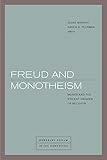Freud and Monotheism : Moses and the Violent Origins of Religion / ed. by Gilad Sharvit, Karen S. Feldman.
Material type: TextSeries: Berkeley Forum in the HumanitiesPublisher: New York, NY : Fordham University Press, [2018]Copyright date: ©2018Description: 1 online resource (208 p.)Content type:
TextSeries: Berkeley Forum in the HumanitiesPublisher: New York, NY : Fordham University Press, [2018]Copyright date: ©2018Description: 1 online resource (208 p.)Content type: - 9780823280025
- 9780823280056
- 150.19/52 23
- online - DeGruyter
- Issued also in print.
| Item type | Current library | Call number | URL | Status | Notes | Barcode | |
|---|---|---|---|---|---|---|---|
 eBook
eBook
|
Biblioteca "Angelicum" Pont. Univ. S.Tommaso d'Aquino Nuvola online | online - DeGruyter (Browse shelf(Opens below)) | Online access | Not for loan (Accesso limitato) | Accesso per gli utenti autorizzati / Access for authorized users | (dgr)9780823280056 |
Frontmatter -- Contents -- Introduction -- 1. "Why [the Jews] Have Attracted This Undying Hatred" -- 2. Geistigkeit: A Problematic Concept -- 3. Heine and Freud: Deferred Action and the Concept of History -- 4. Freud's Moses: Murder, Exile, and the Question of Belonging -- 5. A Leap of Faith into Moses: Freud's Invitation to Evenly Suspended Attention -- 6. Freud, Sellin, and the Murder of Moses -- 7. Creating the Jews: Mosaic Discourse in Freud and Hosea -- 8. Is Psychic Phylogenesis Only a Phantasy? New Biological Developments in Trauma Inheritance -- Contributors -- Index
restricted access online access with authorization star
http://purl.org/coar/access_right/c_16ec
Over the last few decades, vibrant debates regarding post-secularism have found inspiration and provocation in the works of Sigmund Freud. A new interest in the interconnection of psychoanalysis, religion and political theory has emerged, allowing Freud's illuminating examination of the religious and mystical practices in "Obsessive Neurosis and Religious Practices," and the exegesis of the origins of ethics in religion in Totem and Taboo, to gain currency in recent debates on modernity. In that context, the pivotal role of Freud's masterpiece, Moses and Monotheism, is widely recognized. Freud and Monotheism brings together fundamental new contributions to discourses on Freud and Moses, as well as new research at the intersections of theology, political theory, and history in Freud's psychoanalytic work. Highlighting the broad impact of Moses and Monotheism across the humanities, the contributors hail from such diverse disciplines as philosophy, comparative literature, cultural studies, German studies, Jewish studies and psychoanalysis.Jan Assmann and Richard Bernstein, whose books pioneered the earlier debate that initiated the Freud and Moses discourse, seize the opportunity to revisit and revise their groundbreaking work. Gabriele Schwab, Gilad Sharvit, Karen Feldman, and Yael Segalovitz engage with the idiosyncratic, eccentric and fertile nature of the book as a Spӓtstil, and explore radical interpretations of Freud's literary practice, theory of religion and therapeutic practice. Ronald Hendel offers an alternative history for the Mosaic discourse within the biblical text, Catherine Malabou reconnects Freud's theory of psychic phylogenesis in Moses and Monotheism to new findings in modern biology and Willi Goetschel relocates Freud in the tradition of works on history that begins with Heine, while Joel Whitebook offers important criticisms of Freud's main argument about the advance in intellectuality that Freud attributes to Judaism.
Issued also in print.
Mode of access: Internet via World Wide Web.
In English.
Description based on online resource; title from PDF title page (publisher's Web site, viewed 02. Mrz 2022)


